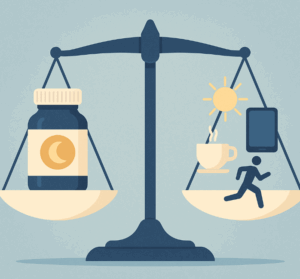Melatonin vs Lifestyle: Which Matters More for Sleep?
 Melatonin has become a household name, often reaching for the title of the “go-to sleep solution.” But while supplements can help in certain situations, the bigger question is: how much of our sleep health depends on melatonin, and how much depends on the choices we make every day?
Melatonin has become a household name, often reaching for the title of the “go-to sleep solution.” But while supplements can help in certain situations, the bigger question is: how much of our sleep health depends on melatonin, and how much depends on the choices we make every day?
Melatonin: The Body’s Night Signal
Melatonin is a hormone secreted by the pineal gland in response to darkness. It tells the body, “It’s time to wind down.” When taken as a supplement, melatonin can:
-
Shift circadian rhythm: Helpful for jet lag or delayed sleep phase.
-
Promote sleep onset: Especially when timed 30–90 minutes before bedtime.
-
Support certain groups: Children with neurodevelopmental disorders, shift workers, or older adults with low natural melatonin.
But melatonin isn’t a sedative. It won’t keep you asleep or solve underlying causes of poor sleep.
Lifestyle: The Bigger Lever for Sleep
While melatonin acts as a signal, lifestyle sets the stage for whether that signal leads to restful sleep.
1. Light Exposure
-
Morning sunlight: Anchors the circadian rhythm.
-
Evening screen time: Blue light suppresses melatonin release, delaying sleep.
-
Dark bedrooms: Reinforce the brain’s night signal.
2. Sleep Schedule
-
Consistency is king. Going to bed and waking up at different times confuses the circadian clock.
-
Irregular weekends (social jet lag): Disrupt the natural rhythm more than most people realize.
3. Caffeine and Alcohol
-
Caffeine: Even afternoon coffee can linger and delay sleep onset.
-
Alcohol: May hasten sleep onset but fragments sleep later in the night.
4. Physical Activity
-
Regular exercise: Deepens sleep, but late-night vigorous workouts may push bedtime later.
5. Stress and Mental Health
-
Racing thoughts: Anxiety and stress override melatonin’s calming signal.
-
Relaxation practices: Meditation, breathing, or reading before bed are often as powerful as supplements.
Melatonin vs Lifestyle: A Balanced View
-
Melatonin helps most when: Sleep timing needs a shift (jet lag, shift work, circadian rhythm disorders).
-
Lifestyle matters most when: The problem is inconsistent schedules, poor habits, or stress-driven insomnia.
In practice, melatonin is like an assistant director. It cues the scene, but the main act—sleep—depends on how the set is arranged. Without lifestyle changes, melatonin is often a short-term patch.
Practical Takeaways
-
Try lifestyle first: Regular bedtime, morning sunlight, screen curfew, caffeine cut-off by mid-afternoon.
-
Use melatonin strategically: Low dose, right timing, short duration.
-
Seek help if sleep remains poor: Chronic insomnia often requires cognitive-behavioral therapy for insomnia (CBT-I) or medical evaluation.
Bottom Line
Melatonin is useful, but lifestyle is foundational. Think of melatonin as a helpful nudge to the body clock. Real, lasting sleep health comes from aligning your daily choices with your body’s natural rhythm.
About the Author
I’m Dr. Srinivas Rajkumar T, MD (AIIMS, New Delhi), Consultant Psychiatrist based in Chennai. Through my clinical practice and writing, I aim to make psychiatry more understandable and less intimidating.
📍 Mind and Memory Clinic, Apollo Clinic, Velachery, Chennai (Opp. Phoenix Mall)
📞 +91 85951 55808
🌐 srinivasaiims.com